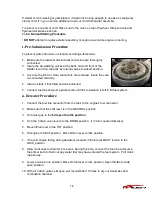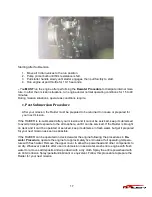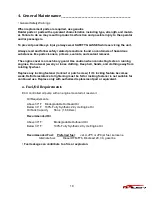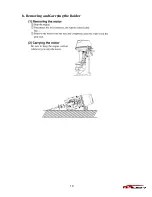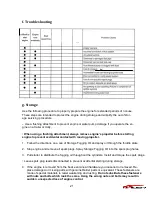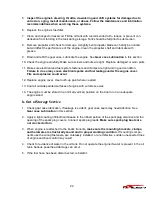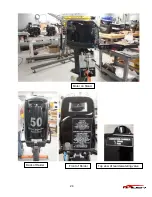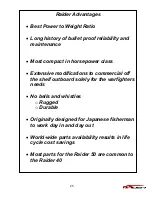
14
p. Impact Damage
Your boat and engine can be seriously damaged by a collision at high or low speeds, while
trailering, or in the water.
If you hit an object, stop immediately and examine the engine for loose mounting hardware
or clamp screws. Inspect for damage to stern and swivel brackets, and components in the
area of impact. Also, examine the boat for damage. Tighten any loose hardware. If collision
occurred in the water, proceed slowly to shore. Before operating again, inspect all compo-
nents.
Failure to inspect for damage can result in sudden, unexpected component failure
and loss of boat control. Uncorrected damage can adversely affect the boat and en-
gine's ability to resist subsequent collisions.
q. Special Operating Conditions
Sea Water
Fresh water flushing is recommended after use in salt, polluted, or brackish water to
prevent deposits from clogging the cooling passages.
Check gear case anodes for deterioration, and replace if necessary.
During long periods of non-use, tilt engine so that the gear case is out of the water, unless the
temperature is below 32
°
F (0
°
C). When removing engine from water, allow cooling system to
drain completely by placing engine in upright position.
Weedy Water
Weeds can block the water intakes and cause engine to overheat. Weeds on the propeller will
cause engine to vibrate.
Run at slow speeds and reverse engine frequently to clear weeds from propeller. Check water
pump indicator often. Remove weeds from propeller and water intakes before operating in clear
water.
Freezing Weather
To avoid engine damage, keep the gear case submerged in the water at all times. Before oper-
ating in freezing temperatures, check gear case lubricant. If leakage is found, gear case seals
will need service.
When removing engine from water, keep the engine in an upright position until the cooling sys-
tem is completely drained.
Water that leaks into gear case or is left in the cooling system can freeze when the engine is
removed from the water. This can cause serious damage.
r. Overheating
DO NOT
operate engine out of water even momentarily.
The engine’s Water Temperature sensor is NOT a warning device.
The Raider does not have an overheat warning. The Raider will not initiate a warning to prevent
powerhead damage. The EMM will only monitor and store a code in the event of an overheat.

















